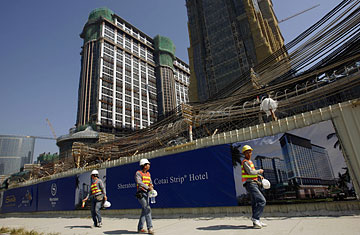
Workers walk in front of the construction site of Sheraton Macao Hotel in Macau on Nov. 13, 2008
If they built the casinos, the gamblers would come. That was the idea, anyway. Since a 40-year gambling monopoly ended in 2002 and the Sands Macau, the first foreign-operated casino in Macau, opened its doors two years later, that has certainly been the case. Over the past four years, the casino giants of the tiny Chinese territory, including Sheldon Adelson, Steve Wynn and Stanley Ho, have enjoyed sky-high growth rates and billions of dollars in revenue.
But in the wake of the faltering global economy, Macau is not such a sure bet anymore. The problem is that some of those giants embarked on overzealous building sprees — since 2004, the number of casinos in Macau has more than doubled to 31 — and now the global credit crisis is threatening to topple at least one of them. Adelson's company, Las Vegas Sands, has undertaken an aggressive expansion plan over the past few years, winning the bid to build the $4.6 billion Marina Bay Sands casino-resort in Singapore and developing a $743 million casino-resort in Pennsylvania, among other projects. The credit crisis has left the overextended company in danger of defaulting on $5.2 billion of loans secured by its Las Vegas operations. Last week, the company said it would work towards completing the Marina Bay site, but Singapore's government is making backup plans to enact if the Sands fails to raise the necessary funds to complete construction. Then, on Nov. 13, the cash-strapped company announced that it would layoff up to 11,000 construction workers in Macau, after its decision to suspend work on part of the Cotai Strip — a $12 billion undertaking. On Thursday, Las Vegas Sands' share price closed at $5.58, down 95% from its peak last December.
The postponement of the Sands' Cotai Strip project may not be end of the bad news, according to Gabriel Chan, a Credit Suisse gaming analyst in Hong Kong. While operators are still making profits, the Sands isn't the only one that may have difficulty finding cash to finance its newest developments. Chan says the Galaxy Entertainment Group, which is building the Cotai Mega Resorts in Macau, is also likely to run into trouble. Any additional job cuts will further kindle discontent among blue-collar Macanese workers, who have long complained about losing construction jobs to less expensive mainland workers.
Earlier this year, Macau's government had already started to hit the brakes. In April, Macau's Chief Executive Edmund Ho announced that no new gambling licenses would be issued to additional operators, and that current concession-holders would not be able to apply for additional gaming tables or slot machines. That set a limit on future building, but Beijing was also concerned about the volume of mainland tourists frittering away their money at the tables in Macau — the only place on Chinese soil where gambling is legal. Each day, crowds of hopeful punters cross into Macau from Zhuhai, in mainland China, and pack ferries sailing in from nearby Hong Kong. Over the past few months, Beijing has imposed stricter visa restrictions to cut down on the frequency that mainland Chinese can visit the former Portuguese colony. As a result, gaming revenues dropped by 10% in the third quarter compared to the previous quarter — the second consecutive quarter to post a decline. And as factories in southern China collapse and thousands of jobs are lost in the region, even fewer mainlanders will be heading for Macau's tables.
In the long run however, all this may be good news, says Desmond Lam, a senior research fellow at the University of South Australia who specializes in casino marketing and Chinese gaming. He says the current stumbling blocks may force Macau to address some of the economic and social problems that have started to fester beneath those glowing numbers. "On a whole, [the slowdown] is good for Macau," he says. "It was going too fast." Since 2003, gaming revenue has increased by an average of 30% per year, eclipsing that of the Las Vegas Strip by 2006. With 54% of GDP in 2007 coming from gaming, Macau has become somewhat of a one-trick pony that has neglected to develop other sectors. "The gaming industry has been growing at the expense of other industries," says Chan, who stresses that small- and medium-size businesses cannot match the high salaries offered by the casinos. The local government evidently agrees: In his annual policy address on Nov. 11, Ho announced a $1.3 billion stimulus package of infrastructure improvements, income tax cuts, and cash handouts of roughly $640 per citizen. "Anything that allows the industry some breathing room is good," says Lam. "This is a good time to rest, and to re-think policies."
Still, many continue to think that the cards are stacked in Macau's favor. "The growth is not quite dead yet," says Credit Suisse's Chan, who forecasts a 4% decline in gaming revenue growth in 2009, but a rebound to 16% growth in 2010. Lam says gambling may even be recession-proof. "Gambling is an industry that in good times, people play, and in bad times people play," he says. The casinos have been built in Macau. Now it's up to Beijing to decide whether or not to let its people play.
(See pictures from the beginning of Macau's boom days here.)
